
JOURNAL OF COMPLEXITY
Scope & Guideline
Decoding the Dynamics of Complex Systems
Introduction
Aims and Scopes
- Complexity Theory:
This area examines the inherent difficulty of computational problems, including the classification of problems based on their resource requirements and the exploration of algorithmic efficiency. - Optimization Methods:
The journal covers various optimization methodologies, including convex and non-convex optimization, regularization techniques, and iterative algorithms for solving complex optimization problems. - Numerical Analysis and Approximation Theory:
Studies in this domain focus on numerical methods for solving mathematical problems, including approximation techniques, error bounds, and convergence analysis for various numerical schemes. - Stochastic Processes and Models:
Research in this area explores stochastic differential equations, Markov chain Monte Carlo methods, and other probabilistic models that are fundamental to understanding complex systems. - Machine Learning and Data Analysis:
The journal includes works on the intersection of complexity and machine learning, addressing topics such as neural networks, learning algorithms, and statistical learning theory. - High-dimensional and Functional Data Analysis:
This scope focuses on the complexities associated with high-dimensional data, including approximation techniques, sampling strategies, and the challenges of functional data.
Trending and Emerging
- Adaptive and Online Algorithms:
Recent publications highlight a growing interest in adaptive algorithms that can adjust in real-time to the data being processed, reflecting the demands of dynamic and complex environments. - Machine Learning Integration:
There is an increasing convergence of complexity theory with machine learning techniques, particularly in neural networks and deep learning approaches, indicating a robust trend towards applying complexity concepts in data-driven contexts. - Stochastic Analysis Techniques:
Emerging themes include advanced stochastic methods, particularly in the context of stochastic differential equations, showcasing a trend towards addressing uncertainty in complex systems. - High-dimensional Data Analysis:
Research focusing on high-dimensional data and its associated complexities is trending, with studies addressing approximation, sampling, and computational challenges in this area. - Non-convex Optimization:
The journal is increasingly featuring works on non-convex optimization problems, reflecting the growing recognition of their importance in both theoretical and applied contexts.
Declining or Waning
- Traditional Numerical Methods:
There has been a noticeable decrease in publications focusing on classical numerical methods without modern adaptations or considerations for high-dimensional contexts. - Basic Statistical Methods:
The journal has seen a decline in papers centered on conventional statistical approaches, particularly those that do not integrate complexity theory with statistical learning frameworks. - Purely Theoretical Studies:
Research that focuses solely on theoretical aspects without practical implications or computational methods has become less frequent, indicating a shift towards more applied and interdisciplinary studies. - Deterministic Algorithms:
There is a waning interest in deterministic algorithms that do not consider the complexities of randomness or uncertainty, as the field increasingly values adaptive and stochastic approaches.
Similar Journals
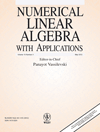
NUMERICAL LINEAR ALGEBRA WITH APPLICATIONS
Innovating Solutions through Numerical Linear AlgebraNUMERICAL LINEAR ALGEBRA WITH APPLICATIONS, published by Wiley, is a premier journal dedicated to advancing the fields of numerical linear algebra, applied mathematics, and their interrelated applications. With ISSN 1070-5325 and E-ISSN 1099-1506, it has established itself as an essential resource for researchers, academics, and practitioners interested in cutting-edge developments in numerical methods and their practical implications. The journal has attained an impressive Q1 ranking in both Algebra and Number Theory and Applied Mathematics as of 2023, highlighting its influence and prestige within the mathematical community. Spanning from 1994 to 2024, NUMERICAL LINEAR ALGEBRA WITH APPLICATIONS is recognized for its rigorous peer-reviewed publications that address the theoretical and algorithmic advancements in numerical linear algebra, making it a critical reference for professionals and students alike. The journal is not Open Access, which encourages subscribers to gain access to high-quality research outputs that promote innovation and multidisciplinary collaborations in mathematics.

JOURNAL OF OPTIMIZATION THEORY AND APPLICATIONS
Exploring New Dimensions in Applied MathematicsJOURNAL OF OPTIMIZATION THEORY AND APPLICATIONS, published by Springer/Plenum Publishers, is a prestigious academic journal that has been at the forefront of the fields of applied mathematics, control and optimization, and management science since its inception in 1967. With an ISSN number of 0022-3239 and an E-ISSN of 1573-2878, it is recognized for its rigorous peer-reviewed content and aims to provide a platform for the dissemination of research that advances theoretical frameworks and practical applications in optimization. As of 2023, the journal holds an impressive Q1 ranking in both Applied Mathematics and Control and Optimization, showcasing its impact and influence in these domains. The journal is also highly ranked in the realm of management science and operations research, making it a vital resource for academics, professionals, and students alike. Though it does not currently offer open access, the journal's articles are widely accessible through institutional subscriptions. Significantly, its long-standing commitment to scholarly excellence positions it as a key player in fostering innovative research and discussions that impact various real-world challenges in optimization.

PROGRAMMING AND COMPUTER SOFTWARE
Elevating the Standards of Programming Knowledge Since 1978PROGRAMMING AND COMPUTER SOFTWARE is a distinguished journal committed to advancing the field of software development and programming methodologies. Published by PLEIADES PUBLISHING INC, this journal has been a valuable resource since its inception in 1978, reaching out to researchers, professionals, and students alike. With an emphasis on rigorous peer-reviewed articles, the journal holds a Q3 ranking in the realm of Software according to the latest 2023 Category Quartiles. Though it does not offer open access, the journal ensures that high-quality research is disseminated to its audience, providing insights into evolving programming techniques, software engineering challenges, and innovative solutions. With its convergence of years extending to 2024, PROGRAMMING AND COMPUTER SOFTWARE remains a pivotal publication, fostering a deeper understanding of the complexities in computer programming while supporting the broader software community.
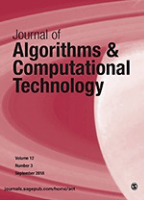
Journal of Algorithms & Computational Technology
Fostering Collaboration in Algorithmic Research and PracticeJournal of Algorithms & Computational Technology, published by SAGE PUBLICATIONS LTD, serves as a noteworthy platform for scholars and practitioners in the realms of applied mathematics, computational mathematics, and numerical analysis. With an ISSN of 1748-3018 and an E-ISSN of 1748-3026, this Open Access journal has been disseminating high-quality research since 2007, ensuring that significant advancements in algorithmic techniques and computational methodologies are readily accessible to the global academic community. Based in the United Kingdom, this journal has steadily established itself within specialized quartiles, notably achieving Q3 ranking in Computational Mathematics and Q4 in both Applied Mathematics and Numerical Analysis for 2023, reflecting its growing influence in these fields. As the journal converges from 2011 to 2024, it aims to cater to the needs of researchers, professionals, and students by publishing innovative research that not only addresses theoretical frameworks but also provides practical applications. By leveraging its open-access model, the Journal of Algorithms & Computational Technology fosters a collaborative environment where knowledge can flourish, allowing for the continuous evolution of algorithms that drive technological advancement.
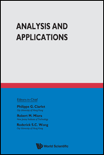
Analysis and Applications
Bridging Theory and Application for Mathematical InnovationAnalysis and Applications is a prestigious academic journal dedicated to the interdisciplinary exploration of analysis and applied mathematics. Published by WORLD SCIENTIFIC PUBL CO PTE LTD and based in Singapore, this journal serves as a vital resource for researchers, professionals, and students engaged in mathematical investigations that extend theoretical concepts into practical applications. With an impressive Impact Factor reflective of its esteemed reputation, it currently ranks in Q1 across both Analysis and Applied Mathematics categories, showcasing its relevance in advancing knowledge within these fields. The journal's commitment to high-quality scholarly articles is underlined by its excellent performance in Scopus rankings, placing it in the top percentiles of mathematics disciplines. Analysis and Applications invites contributions that not only deepen theoretical frameworks but also translate findings into applicable methodologies, ultimately fostering innovation and progress in mathematical sciences. For those seeking a gateway into cutting-edge research and developments, this journal is a crucial platform to engage with the latest insights and collaborative opportunities.

CSIAM Transactions on Applied Mathematics
Transforming Challenges into Solutions through MathCSIAM Transactions on Applied Mathematics is a prestigious academic journal published by GLOBAL SCIENCE PRESS, specializing in the rapidly evolving field of applied mathematics. Established in 2020 and operating in Hong Kong, this journal has quickly gained recognition for its rigorous peer-reviewed articles and contributions that integrate theoretical frameworks with practical applications. With an impressive ranking of #261 out of 635 in the Scopus database, and a 2023 quartile ranking of Q2 in Applied Mathematics, it is positioned to be a vital resource for researchers, professionals, and students alike. The journal offers a platform for innovative research that is essential for addressing contemporary challenges in science and engineering, promoting interdisciplinary collaboration and knowledge exchange. Although currently not Open Access, it provides invaluable insights through its curated content, truly reinforcing its role as a cornerstone in the field of applied mathematics.

International Journal of Mathematics and Computer Science
Bridging Theory and Application in Mathematics and ComputingThe International Journal of Mathematics and Computer Science (ISSN: 1814-0424, E-ISSN: 1814-0432), published by Lebanese University, serves as a vital platform for disseminating innovative research and advancements in the fields of mathematics and computer science. With a compelling range of topics including Algebra, Applied Mathematics, Computational Mathematics, and Statistical Analysis, this journal caters to a broad audience of researchers, professionals, and students. Spanning the years from 2017 to 2025, it has established a presence in several key quartiles, including Q3 rankings in Applied Mathematics and Computational Mathematics, and a Q4 ranking in Algebra and Number Theory. While currently not an open-access journal, it provides valuable insights through its rigorous peer-reviewed process, enhancing its relevance in both theoretical and applied domains. Furthermore, its presence in Scopus rankings reflects its commitment to quality, making it an essential resource for anyone looking to explore the intersection of mathematics and computer science.
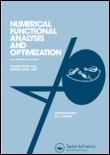
NUMERICAL FUNCTIONAL ANALYSIS AND OPTIMIZATION
Bridging disciplines to enhance understanding in functional analysis.NUMERICAL FUNCTIONAL ANALYSIS AND OPTIMIZATION, published by Taylor & Francis Inc, is a premier international journal dedicated to advancing the fields of analysis, optimization, and applied mathematics. With its ISSN 0163-0563 and E-ISSN 1532-2467, this journal has established itself as a vital resource for researchers and practitioners seeking to explore innovative methodologies and applications. Covering a broad spectrum of topics intersecting mathematical analysis and computer science, it has consistently ranked in the Q2 tier for Analysis and Control and Optimization categories and is well-regarded in the communities of Signal Processing and Computer Science Applications. The journal's commitment to publishing high-quality research ensures significant contributions to solving complex problems in various fields, making it an essential reference for students, academics, and industry professionals. With a publishing history dating back to 1979, it encourages the dissemination of groundbreaking ideas and practical methodologies, fostering a collaborative academic environment. Access to the published articles may vary, so contributors and readers are encouraged to engage with the latest findings and ongoing research through the journal’s platform.

JSIAM Letters
Fostering Collaboration in the Mathematical CommunityJSIAM Letters, with ISSN 1883-0609 and E-ISSN 1883-0617, is an esteemed journal published by the Japan Society of Industrial and Applied Mathematics (JSIAM). Focusing on the latest advancements in the field of industrial and applied mathematics, this journal serves as a vital platform for researchers, professionals, and students to disseminate their findings and exchange innovative ideas. Although it currently does not offer Open Access options, JSIAM Letters maintains a strong reputation for high-quality, peer-reviewed articles that contribute to the growth and application of mathematical techniques in various industrial contexts. With a commitment to fostering collaboration within the mathematical community, JSIAM Letters plays a crucial role in bridging the gap between theoretical research and practical application, making it indispensable for anyone interested in the intersection of math and industry.
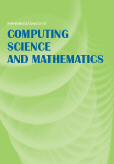
International Journal of Computing Science and Mathematics
Empowering Research in Computing Science and MathematicsThe International Journal of Computing Science and Mathematics, published by INDERSCIENCE ENTERPRISES LTD, is a pivotal platform for the dissemination of cutting-edge research in the intertwined disciplines of computing science and mathematics. With an ISSN of 1752-5055 and an E-ISSN of 1752-5063, the journal primarily serves the academic community engaged in applied mathematics, computational mathematics, theoretical computer science, and more, making significant contributions that resonate across various fields of technology and science. While the journal is currently categorized in the Q4 quartile for multiple related fields, including Applied Mathematics and Computational Theory, it continues to strive towards advancing the knowledge and practice within these areas. Spanning years from 2007 to 2010 and again from 2012 to 2024, the journal seeks to publish high-quality, peer-reviewed articles that not only address theoretical advancements but also explore practical applications of computing science in mathematical contexts, thereby fostering collaboration among researchers, professionals, and students alike. Please note that this journal is not available as Open Access, thus ensuring a curated content selection intended for dedicated research communities.